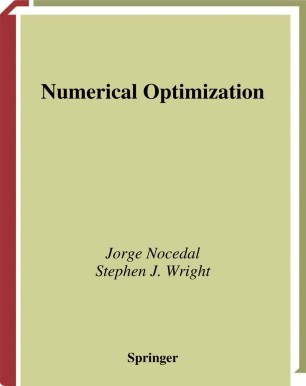
This method depend on both the direction \(p_k\) and the step length \(a_k\)
\(x_{k+1}=x_k+a_kp_k\)
\(wolfe\; conditions \begin{cases} sufficient\;decrease\;condition \\ curvature\;conditions\end{cases}\)
\(\begin{cases} f(x_k+a_kp_k) \leq f(x_k)+c_1a_k\nabla f_k^Tp_k \\ \nabla f(k_k+a_kp_k)^T\geq c_2\nabla f_k^T p_k\end{cases}\)
lemma 3.1
\(P_K\)is a desent direction at \(x_k\) and assume that f is bounded below along the ray {\(x_k+\alpha p_k|\alpha >0\)},if \(0<c_1<c_2<1\),show that there exist intervals of step lengths satisfying the wolfe conditions and the strong wolfe conditions.
proof:
since \(\phi(\alpha)=f(x_k+\alpha p_k)\) is bounded below,the \(l(\alpha)=f(x_k)+\alpha _k c_1\nabla f_k ^Tp_k\) must intersect with the \(\phi (\alpha)\),thus there exist a \(\alpha '\)
\(f(x_k+\alpha' p_k)=f(x_k)+\alpha ' c_1\nabla f_k ^Tp_k\)
then the \(\alpha <\alpha'\)meet the sufficient decrease condition.
since the mean value theorem,\(f(x_k+\alpha' p_k)-f(x_k)=\alpha'\nabla f(x_k+\alpha ''p_k)^Tp_k\;\;\;\alpha ''\in (0,\alpha')\)
thus \(\nabla f(x_k+\alpha ''p_k)^Tp_k=c_1\nabla f_k ^Tp_k>c_2\nabla f_k ^Tp_k\),which meet the curvature condition,because the left of the inequalities is negetive ,so the strong wolfe conditions hold in the same interval.